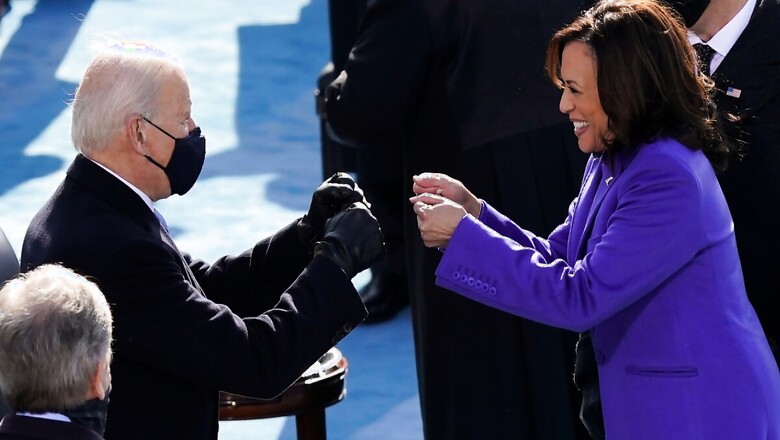
views
He delivered a heartfelt eulogy for a segregationist he worked closely with. He has advocated cuts to Social Security programmes. He has championed laws that sought to push mass incarceration. No, we’re not talking about a Republican. This is Joe Biden.
Now the President of a country deeply divided, the Democrat has projected himself as the logical solution to the chaotic term of Donald Trump. But as always, the truth is complicated.
He was not progressives’ first choice. But as the US continued to fall on hard, and harder times, a moderate option seemed a safer pick than ‘socialist’ Bernie Sanders, or Elizabeth Warren. After Sanders backed out of the presidential race, most Democrats seemed to tie themselves together in a united front against defeating Trump.
Biden’s campaign received support from a new generation of voters who came to the fore after the powerful Black Lives Matter movements.
Justin Blake, uncle of Joseph Blake, a black man who was shot by a US police officer seven times in the back in front of his children wrote in The Guardian that Biden was “far from perfect” for black voters.
“Democrats often invoked “loyalty” as the quality they hoped to inspire in their voters. But “loyalty” is a two-way street: party leaders shouldn’t expect it if they can’t deliver for the voters who put them in office. And on this front, particularly with Black voters, Biden is far from perfect. He spearheaded the 1994 crime bill, for instance, which expanded mass incarceration and hurt Black communities across the country,” he said.
ALSO READ| Not Your Average Joe: The Biden Presidency Brings Hope with Daunting Challenges
The Violent Crime Control and Law Enforcement Act aka the 1994 crime law was led by Biden and other Democrats looking to address the problem of rising crime in the US. The move was political in nature too – to wrest the popular issue from the Republicans at the time. A Vox report on the law suggests that while the law was meant to increase mass incarceration – which has been said to disproportionately affect blacks – the real effect was subdued.
Despite that, his record with other drug laws linked to increasing racial disparity sounds an alarm. The President has promised a variety of criminal justice reforms, as the anti-racism movement gains centre stage after the death of George Floyd.
But it remains to be seen if Biden will stay on the course or step back, if crime rates were to rise again.
A Moderate institutionalist?
As the pandemic exposed gaping holes in America’s healthcare system, Biden, during his Democratic primary fight, opposed Sander’s ‘Medicare for All’ plan, citing its price. While Sanders said the programme would cost between $30 trillion and $40 trillion over a 10-year period, he argued it would also reduce overall health expenditures through increased efficiencies.
A Yale University study has also said the single-payer health-care would save $450 billion annually. But the structurally transformative plan has found very few takers, and even Biden’s Affordable Care Act (ACA) expansion is set to face challenges in the Congress.
ACA, however, is more expensive than Medicaid coverage. A recent study by the Journal of American Medical Association says ACA plans leave patients with 10 times more out-of-pocket spending.
Biden’s proposal has also sought to create a new cap for mid-level health plans – 8.5 per cent of an individual or family’s income on premium contributions. But reports say the ACA option is not availed by many Americans—while it allows people to choose, the health insurance options are limited and expensive accompanied by ‘nightmarish’ deductibles.
ALSO READ| Trump Left a Letter to Joe Biden at White House and Twitter Hilariously ‘Revealed’ What’s in it
At least two major health insurers, Anthem and Centene donated to Biden’s inaugural committee. Both of them offer plans in the US marketplace exchanges. For his presidential campaign, Centene’s CEO bundled contributions, and Independence Blue Cross’s CEO headlined Biden’s first big campaign fundraiser.
Some would argue that Biden has always been a moderate institutionalist. But the political scene in America has changed, reflected in more ways than one, in the last year. When Biden, during a Democratic primary debate, espoused the “civility” of an earlier time, invoking two Southern segregationist senators by name, he was slammed by Kamala Harris among other Democratic presidential contenders.
Harris also criticised Biden’s past opposition to busing. To diversify the racial make-up of schools, race-integration busing was a practice that involved transporting both black and white students to schools, within or outside their local school districts. While the Biden campaign has attributed his opposition to reasons other than racial segregation, it cannot be denied that his record with busing as a young Senator has hints of political opportunism.
Award-winning journalist Richard Ben Cramer in his book ‘What it Takes’ says about Biden: “Joe Biden shared his life — or his version of it — continuously. He confided it, displayed it, spread it profligately, even expanded it to connect it with your life. He would settle for nothing less.” His claims of participating in civil rights marches vary in his own versions – and have also been disputed.
Kamala Harris’ Chequered Past
Even his vice-presidential pick, Kamala Harris, celebrated by the media for being the first female black, and Indian-origin Veep, has a contradicting record.
Kamala Harris’ own record with busing is unclear. Clearer is her support for an ICE policy as then district attorney in San Francisco – a programme that required police to notify ICE about undocumented youth arrested for felonies, in some cases for minor crimes. A HuffPost report states the juveniles were handed over to Immigration and Customs Enforcement even before guilt or innocence was proved.
Harris’ criminal justice record has been a ‘balancing act’, according to a Vox report. While many reforms and liberal stands (that also cost her key political allies) do embellish her career as a ‘progressive prosecutor’, there are others, such as her anti-truancy programme, which question her leanings.
ALSO READ| Biden Vows to Mend Alliances, Engage with World Again as ‘Trusted’ Partner for Peace and Security
Her handling of appeals for release of innocent people is also fraught with such moves. In one such case, her office argued against the release of Daniel Larsen, who was proven innocent in the court of law. Why was this? Harris’ office claimed he filed his petition for release far too late after a legal deadline. The court disagreed, allowing Larsen’s release in 2013.
Lara Bazelon in The New York Times argued that amid Harris’ shifting stances on key policies, such as marijuana legalisation and her office’s wrongful convictions, she needed to “radically break with her past” if she wanted people who cared about “dismantling mass incarceration and correcting miscarriages of justice to vote for her.”
Read all the Latest News, Breaking News and Coronavirus News here














Comments
0 comment